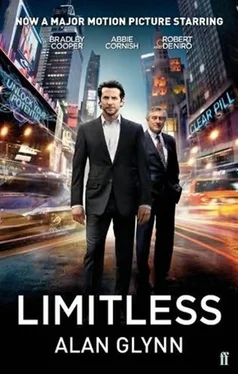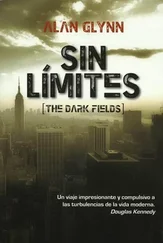By the closing bell at four o’clock, it was my room.
Over the next couple of days, the trading ‘pit’ at Lafayette was packed to capacity – with all of the regulars in attendance, as well as quite a few new faces. I stuck to my short-selling strategy and led an onslaught against a whole series of overhyped and overvalued stocks. My instinct for identifying these stocks appeared to be unerring and it was thrilling to watch them all behave exactly as I had predicted. In turn, people were watching me very closely and naturally wanted to know how I was doing it, but since these same people were also making a lot of money from my recommendations, no one had the temerity to come out straight and simply ask me. Which was just as well, because I wouldn’t really have had an answer.
It did seem to me to be instinct, though – but informed instinct, instinct based on a huge amount of research, which of course, thanks to MDT-48, was conducted more rapidly and comprehensively than anyone at Lafayette would ever realize.
But that also wasn’t enough to explain it – because there were plenty of well-resourced, well-financed research departments around, from the windowless backrooms of investment banks and brokerage houses throughout the country, stuffed full of pale, nameless ‘quants’ number-crunching till dawn, to places stuffed full of Nobel-prize winning mathematicians and economists, places like the Santa Fe Institute and MIT. For an individual, I was processing a huge amount of information – it was true – but I still couldn’t compete with outfits like those.
So what was it?
After the first day of my second week at Lafayette, I tried to evaluate the various possibilities – maybe it was superior information, or heightened instinct, or brain chemistry, or some kind of mysterious synergy between the organic and the technological – but as I sat there at my table, staring vacantly at the screen, these ruminations slowly coalesced into an overwhelming vision of the vastness and beauty of the stock market itself. Grappling for understanding, I soon realized that despite its susceptibility to predictable metaphor – it was an ocean, a celestial firmament, a numerical representation of the will of God – the stock market was nevertheless something more than just a market for stocks. In its complexity and ceaseless motion the twenty-four-hour global network of trading systems was nothing less than a template for human consciousness, with the electronic marketplace perhaps forming humanity’s first tentative version of a collective nervous system, a global brain. Moreover, whatever interactive combination of wires and microchips and circuits and cells and receptors and synapses was required to achieve this grand convergence of band-width and brain-tissue, it seemed to me in that moment that I had tumbled upon it – I was jacked in and booted up… my mind was a living fractal, a mirrored part of the greater functioning whole.
I was also aware – not to lose the run of myself here – that whenever an individual is on the receiving end of a revelation like this, addressed to himself alone (and written out, say, on the night sky, as Nathaniel Hawthorne would have it), the revelation can only be the result of a morbid and disordered state of mind, but surely this was somehow different, surely this was empirical, demonstrable – after all, at the end of my sixth day of trading at Lafayette, I had an unbroken chain of winners and over a million dollars in my brokerage account.
*
That evening I went for a drink with Jay and a few of the others to a place on Fulton Street. After my third beer and half a dozen cigarettes, not to mention a torrent of day-trading lore from my new colleagues, I resolved to set a few things in train – changes that I felt it was now time to make. I resolved to put a deposit down on an apartment – somewhere bigger than my place on Tenth Street, and in a different part of town, maybe Gramercy Park, or even Brooklyn Heights. I also resolved to throw out all my old clothes and furniture and accumulated stuff , and only replace what I absolutely needed. Most important, however, I resolved to move on from day-trading and into a wider playing field, to move up to money management maybe, or hedge funds or global markets.
I’d only been trading for little over a week, so naturally I didn’t have much idea about how I was going to pull something like this off, but when I got back to my apartment, as though on cue, there was a message from Kevin Doyle on my answering machine.
Click.
Beeep .
‘Hi Eddie, Kevin – what is all this stuff I’ve been hearing? Call me.’
Without even taking my jacket off, I picked up the phone and dialled his number.
‘Hello.’
‘So what have you been hearing?’
Beat.
‘Lafayette, Eddie. Everyone’s talking about you.’
‘About me ?’
‘Yeah. I happened to be having lunch with Carl and a few other people today when someone mentioned they’d heard rumours about a day-trading firm on Broad Street – and some trader there who was performing phenomenally. I made a few enquiries after lunch and your name came up.’
I smiled to myself and said, ‘Oh yeah?’
‘And Eddie, that’s not all. I was speaking to Carl again later and I told him what I’d found out. He was really interested, and when I said you were actually a friend of mine he said he’d like to meet you.’
‘That’s great, Kevin. I’d like to meet him. Any time that suits.’
‘Are you free tomorrow night?’
‘Yeah.’
He paused. ‘Let me call you back.’
He rang off immediately.
I went over and sat on the couch and looked around. I was going to be getting out of here soon – and not a moment too soon, either. I envisaged the spacious, elegantly decorated living-room of a house in Brooklyn Heights. I saw myself standing at a bay window, looking out on to one of those tree-lined streets that Melissa and I, on our way from Carroll Gardens into the city, on summer days, had often walked along, and even talked about one day living on. Cranberry Street. Orange Street. Pineapple Street.
The phone rang again. I stood up and walked across the room to answer it.
‘Eddie – Kevin. Drinks tomorrow night? At the Orpheus Room?’
‘Great. What time?’
‘Eight. But why don’t you and I meet at seven-thirty, that way I can fill you in on some stuff.’
‘Sure.’
I put the phone down.
As I stood there, with my hand still on the receiver, I began to feel light-headed and dizzy, and everything went dark for a second. Then, without consciously registering that I had moved – and moved to the other side of the room – I suddenly found myself reaching out to the edge of the couch for something to lean against.
It was only then that I realized I hadn’t eaten anything in three days.
I ARRIVED AT THE ORPHEUS ROOM before Kevin and took a seat at the bar. I ordered a club soda.
I didn’t know what I expected from this meeting, but it would certainly be interesting. Carl Van Loon was one of those names I’d seen in newspapers and magazines all throughout the 1980s, a name synonymous with that decade and its celebrated devotion to Greed. He might be quiet and retiring these days, but back then the chairman of Van Loon & Associates had been involved in several notorious property deals, including the construction of a gigantic and controversial office building in Manhattan. He had also been involved in some of the highest-profile leveraged buyouts of the period, and in countless mergers and acquisitions.
Back in those days, as well, Van Loon and his second wife, interior-designer Gabby De Paganis, had been denizens of the black-tie charity circuit and had had their pictures in the social pages of every issue of New York magazine and Quest and Town and Country . To me, he’d been a member of that gallery of cartoon characters – along with people like Al Sharpton, Leona Helmsley and John Gotti – that had made up the public life of the times, the public life we’d all consumed so voraciously on a daily basis, and then discussed and dissected at the slightest provocation.
Читать дальше












